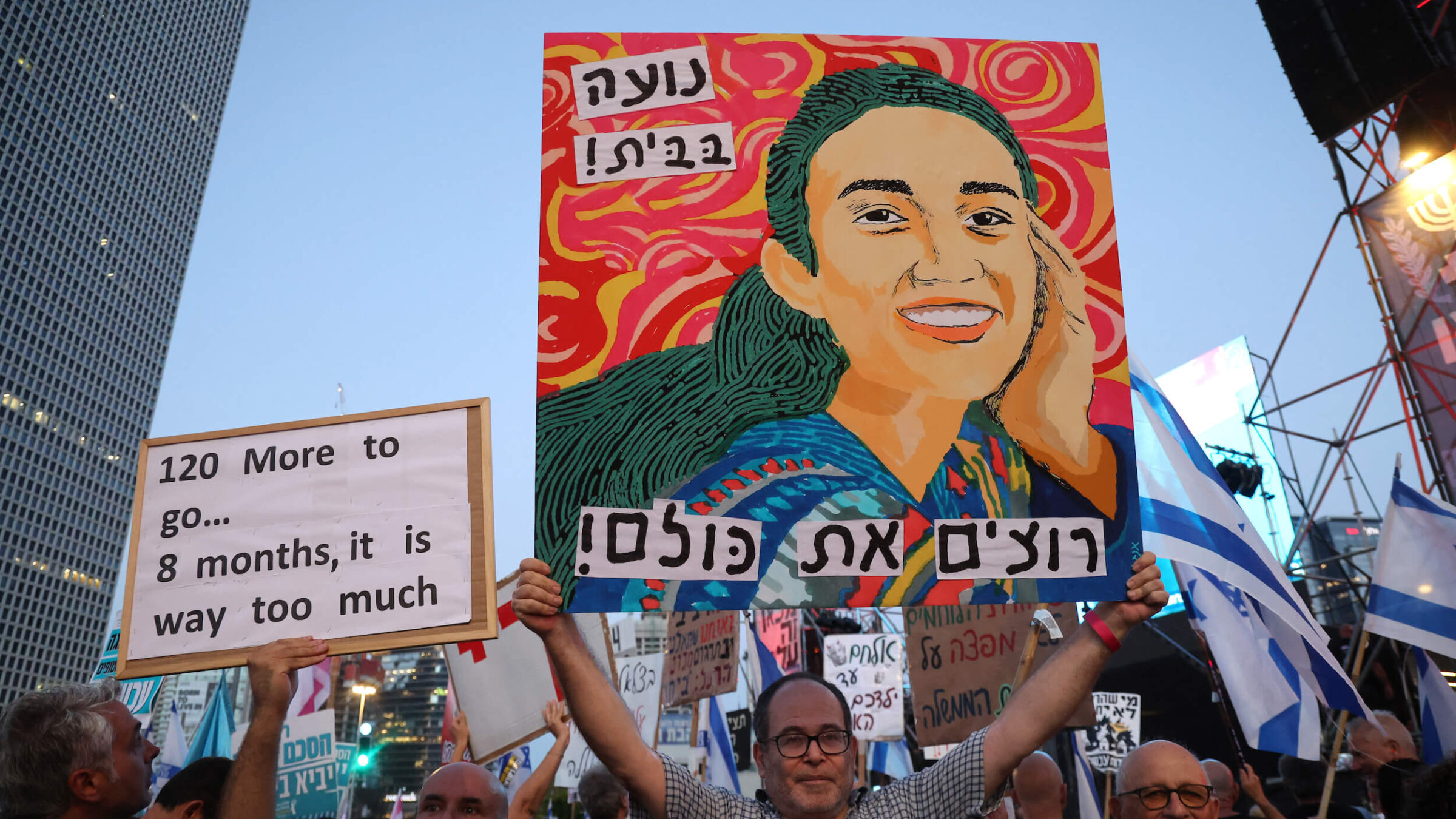The hostage rescue brought unity to Israel — and underscored a great paradox about the country
Internal divisions continue to rock Israel. But Saturday was a day of nationwide joy

A poster depicting Noa Argamani, one of four Israeli hostages rescued by the Israeli army, was held up as Israeli activists rallied on Saturday. Photo by Jack Guez / AFP / Getty Images
Videos of megaphone-wielding lifeguards announcing the news that four hostages had been rescued, sparking the exultant cheers of beachgoers, summed up an “only in Israel” moment on a scorching summer day.
The exuberance — of a kind Israelis have not felt in a long time — was soon tempered by the announcement that Arnon Zamora, a commander of the elite Yamam force who helped lead the rescue, was killed in the operation. Defence Minister Yoav Gallant hailed the father of two as a hero, and Brig. Gen. Daniel Hagari, the military spokesman, said his tragic death underscored Israelis’ willingness to “risk lives to save lives;” Hagari may be a spokesman, but he spoke the honest truth.
Another solemn factor amid the celebrations: The quartet rescued on Saturday — Noa Argamani, Almog Meir Jan, Andrey Kozlov, and Shlomi Ziv — brought the number of hostages extracted by the military to seven. In comparison, more than 100 were released early on in the war via negotiated deals. With some 120 hostages remaining, dozens of whom are presumed dead, negotiation remains the more likely way to achieve their freedom.
Yes, the tactical success of the operation — a raid on the Nuseirat area of central Gaza, which was reportedly planned for many weeks — underscored that Israeli intelligence and special forces can still get the job done, despite the epic breakdowns of Oct. 7. But that success does not change Israel’s fundamental strategic dilemma.
That dilemma has, if anything, grown this past week, as Hamas has appeared increasingly likely to reject the ceasefire proposal President Joe Biden laid out in late May. One reason Hamas may be demurring: The organization is clearly cognizant that Israel will be ready to renew its campaign at the first provocation.
What may be left is for Israel to publicly offer the Hamas leadership in Gaza amnesty and exile, in something of a sort of replay of the 1982 deal that allows Yasser Arafat and his battered Palestinian Liberation Organization to leave Beirut for Tunis — where they remained until the Oslo Accords enabled them to establish an autonomy government in parts of the West Bank and Gaza 12 years later.
If such an offer is what is needed to achieve a ceasefire, Israel must make it. Among the many challenges Israel has faced in this battle is Hamas’ indifference to the lives of Palestinians, whom it deliberately places in harm’s way as its own operatives hide in a massive tunnel network underneath the strip. That pattern held true during Saturday’s raid: It’s significant that the hostages rescued were held in residences, a move that clearly endangered civilians in the surrounding area. Gaza officials claimed on Saturday that more than 200 Palestinians were killed in the rescue, without specifying how many were combatants. To continue to inflict heavy tolls on Palestinian civilians is to play directly into Hamas’ hands.
On one level, the tragedy of this war has been told in numbers — the shocking number of massacre victims on Oct. 7, and the unfathomable amount of death and destruction that has followed in Gaza.
But human beings are programmed to respond most viscerally to stories about individual people — and that is what brought such intensity to Israelis’ reaction to the rescue, especially since some of the hostages, and their family members in Israel, have become well-known figures.
That was especially the case with Argamani, 26, who was shown in one of the first videos Hamas released after Oct. 7 begging the terrorists “Don’t kill me” as they marched her and her boyfriend, Avinatan Or, toward Gaza. Argamani has since appeared in other propaganda videos, and had become a well-known face among the captives. (Or is still in captivity.) It was Argamani’s story that dominated the news cycle after the hostages’ rescue: Her father celebrated his birthday on the day of her retrieval, and before Saturday was over she had reunited with her mother, originally from China, who is battling terminal brain cancer and has publicly begged to see her daughter again before she passes.
She also received a phone call from Prime Minister Benjamin Netanyahu, who said “we didn’t give up on you for a moment” and told her to “get better with your family, and hug your mother as well.”
Yet as is always the case with Netanyahu, nothing he does remains unsullied by controversy. He was already catching heat Saturday for his speech on the raid, which emphasized his own role, as he repeatedly declared that he had authorized and approved the raid. That said, a planned announcement by the moderate National Unity party — which many expected to be that they are leaving Netanyahu’s coalition, deepening internal Israeli disarray — was put off by the events.
The day’s drama underscored something fascinating about Israel: a nation that is famously and perhaps hopelessly divided also deeply yearns to be united. For one day at least, that wish appeared to be fulfilled.
















